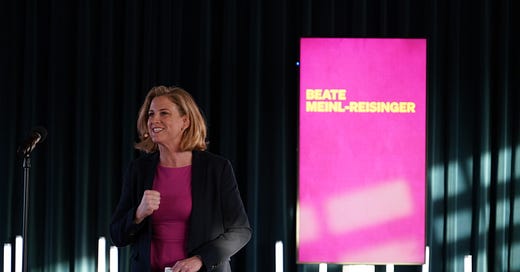Meet The Parties: NEOS
Austria's NEOS answer questions on the economy, healthcare, foreign policy, and whether they would go into coalition with the far-right Freedom Party
With this edition, ahead of the election on September 29, you are receiving the fourth in a series of Q&As with Austria’s leading political parties called “Meet The Parties.” The aim of the series is to help voters make more informed decisions and all readers gain a better understanding of where the parties stand on the economy, healthcare, and foreign policy. The series continues with the liberal NEOS Party led by Beate Meinl-Reisinger.
What do the NEOS stand for? What are your party’s three primary values?
Freedom, progress, and justice.
Immigration and integration have become central to the NEOS’s agenda in recent months. Is there not a danger, though, that by fighting the election on the FPÖ’s battlefield, you are creating a favorable set of political conditions for them?
Defending our liberal democracy against enemies foreign and domestic has always been part of the NEOS’s agenda. For us, it’s obvious that forms of radicalization must be addressed openly and fought against by way of a strong, well-fortified democracy.
Would you go into coalition with the Freedom Party?
There is no viable common basis for a coalition with the Freedom Party.
Austria is in a state of economic malaise. What measures would you take to kickstart the economy?
We are in favor of bold reforms that would take the Austrian economy out of the current crisis and make it more competitive on an international level. We are the only party that is fully committed to expanding the European Union’s internal market. This is crucial for creating cheaper energy, more venture capital, and fewer internal barriers in Europe. We’re calling for tax cuts on work so that employees will have higher net incomes and companies can be disburdened. By modernizing the state through a one-stop shop for all official matters, we want to significantly reduce bureaucracy and make public data management more efficient. Reducing bureaucracy by modernizing trade regulations and other regulatory requirements is also central to our agenda. Austria can do more, but it needs the courage to finally tackle and implement reforms.
How would you resolve the problems in the healthcare system including personnel shortages and longer wait times?
When it comes to the shortage of doctors who take public insurance, state health insurance contracts should be made more attractive so that more doctors want to work in the public system. As for hospital staff, in recent years we have seen, particularly in cases where operations are postponed, that it is often not the lack of doctors but rather nursing staff that is the issue. The federal government needs to provide guidelines so that the states, as the employers in this field, can improve working conditions and create opportunities for nurses to receive further training and specialization.
We can see the consequences of mismanagement and a lack of health literacy in the healthcare system. Many patients visit hospital outpatient clinics because they don't know how to find the right doctors for the treatment they need; doctors' surgeries often have full waiting rooms because of trivialities. If, for example, it were easier for patients with chronic illnesses to obtain digital prescriptions for their medications, this would save everyone time. We see a lot of potential for healthcare staff and patients through reduced bureaucracy, greater digitalization, and improved patient management.
With Russia’s war against Ukraine in mind, does Austria need a new security doctrine? Should it surrender its neutrality and join NATO?
We’ve waited a long time for the new national security strategy, which has not yet been finalized due to disagreements between the coalition partners1. Whether we should join NATO is another matter entirely, but we are in favor of a stronger common European defense strategy acting as the European pillar in the transatlantic alliance. This would not require a constitutional amendment, as Austria amended its constitution accordingly when it joined the EU and is allowed to participate fully in its Common Security and Defense Policy.
Should Austria’s ban on dual citizenship be repealed?
Yes, we are in favor of abolishing the ban on dual citizenship. Austrians living abroad should be allowed to retain their Austrian citizenship when acquiring a foreign citizenship.
As for immigrants, renouncing their previous citizenship should no longer be a prerequisite for being granted Austrian citizenship. This simplification should be realized immediately for EU citizens. After an evaluation, it will be decided to what extent this simplification can also be extended to citizens of other countries.
Thank you for subscribing to the Vienna Briefing. Every recommendation helps, so if you know someone who might be interested in reading this newsletter, consider sharing it with them today.
The Vienna Briefing is a reader-supported publication made possible by your donations. If you would like to contribute to my work, think about sending me a tip.
The center-right People’s Party and the Greens





Personally I think Austria's rules on dual nationality are too strict. I am an Austrian citizen, was born in Austria, my father is Austrian but my mother is English. When I was born in the 60s the law in the UK said women could not pass on their nationality at birth AND Austria's laws said the only time someone could have dual nationality was at birth.
Britain retrospectively revoked that law 5 years ago and anyone in my situation can apply to be a British citizen BUT Austria says because you actually have to apply for the citizenship you cannot keep your Austrian nationality. This seems far too strict as the new law is only undoing an old wrong. Had it been my mother who was Austrian and my Father who was English I would have had no problems. In rare cases like this I would have thought there might be some flexibility but I was told it wasn't possible. It seems grossly unfair.